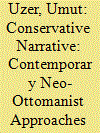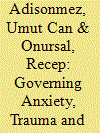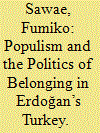|
|
|
Sort Order |
|
|
|
Items / Page
|
|
|
|
|
|
|
| Srl | Item |
| 1 |
ID:
173144


|
|
|
|
|
| Summary/Abstract |
Turkish politicians, intellectuals and ordinary citizens usually take an ambivalent view of the Ottoman state. The founding fathers of Turkey, mostly soldiers and bureaucrats in the Ottoman state structure had, for the most part, negative perceptions owing to the loss of territory and defeats during the latter days of the Ottoman Empire. Consequently, republican Turkey endeavored to create a modern Turkish nation that was very much part of Western civilization. Nevertheless, fascination with the Ottoman Empire rose to the fore during the multiparty era of the 1950s and further increased in the 1980s and now under the Justice and Development Party (AKP) government. The AKP leadership has been articulating a new identity and historical perspective to create a new national identity for Turkey. This article analyzes the nostalgia for the Ottoman Empire in Turkish politics by focusing on the conservative ideologue Necip Fazıl Kısakürek (1904–1983), who had a significant impact on the AKP leadership as well as on efforts to create a new post-Kemalist Turkey.
|
|
|
|
|
|
|
|
|
|
|
|
|
|
|
|
| 2 |
ID:
173146


|
|
|
|
|
| Summary/Abstract |
Abstract: In a region undergoing dramatic changes, the Kurds in particular have begun to enjoy a political resurgence. Of those countries where Kurds reside, Turkey is the single most important actor for several reasons: It is a powerful state that is home to more than half of the total Kurdish population; it has been locked in a stalemate with (arguably) the most powerful Kurdish insurgent group, the Kurdistan Workers’ Party [Partiya Karkeren Kurdistan, PKK]; this decades-long armed conflict progressively has acquired a trans-border disposition and fomented disagreement between Turkey and the United States in Syria; and lastly, Turkey under the Justice and Development Party [Adalet ve Kalkinma Partisi, AKP] gradually is distancing itself from the Western bloc and moving away from democratic values and principles. This article examines the evolving Kurdish question in Turkey with an emphasis on how it is interacting with changing domestic, regional, and global dynamics.
|
|
|
|
|
|
|
|
|
|
|
|
|
|
|
|
| 3 |
ID:
173142


|
|
|
|
|
| Summary/Abstract |
For most of the first decade of its rule, the AKP touted itself as an agent for democratization, receiving much support both inside and outside of Turkey. More recently, the AKP has taken a clear authoritarian turn, raising the issue of why many observers of Turkey, including myself, did not see this coming. This paper looks at some of the blinders that I, among others, wore as we assessed the AKP and prospects for democracy in Turkey. These included excessive faith in the European Union as an external force for democracy, a belief that the military and militant secularism were the primary obstacles to Turkish democracy, confidence that what the AKP represented was an archetype of an Islamic-oriented party that had been ‘moderated’ by political inclusion and its own ‘learning,’ and a belief in the democratic promise of modernization theory. The article’s objective is to open up a wider discussion of lessons learned from the AKP’s years in power and how scholars may wish to revise some of their assumptions about Turkey as well as the broader literature on democratization.
|
|
|
|
|
|
|
|
|
|
|
|
|
|
|
|
| 4 |
ID:
173145


|
|
|
|
|
| Summary/Abstract |
Concern about the ontological security of the state has been at the center of Turkish politics since the beginning of the republican regime in 1923, shaping both the domestic and the foreign policy of Turkey. Taking the July 15 coup attempt in 2016 as a case, this article critically analyzes the political discourse on ontological (in)security in Turkey. The discussion begins by locating the discourse on the survival of the state [beka meselesi in Turkish] in a historical and sociopolitical context. Building on this discussion, the article investigates how unprecedented political instability caused by the failed coup attempt created a political space for the ruling Justice and Development Party to re-articulate the state’s survival discourse and related security practices. The article argues that governing elites followed a double strategy. On one hand, they aimed at simplifying the sociopolitical space with a ‘one nation, one state, one homeland, and one flag’ discourse; on the other hand, they actively prevented public contestation by keeping the political dimension of the coup at bay. To advance this argument, the article develops a discursive-theoretical framework by cross-fertilizing Ontological Security Theory with Post-foundational Discourse Theory.
|
|
|
|
|
|
|
|
|
|
|
|
|
|
|
|
| 5 |
ID:
173143


|
|
|
|
|
| Summary/Abstract |
This paper examines the transformation of President Recep Tayyip Erdoğan’s politics in the AKP government era through the interactive supply-and-demand relationship between populist leaders and their supporters, which has been a focus of recent populist studies. It employs the concept of ‘the politics of belonging’ to scrutinize the mechanisms through which not only the Islamic and conservative boundary of belonging in Turkey but also the meanings of symbols reifying belonging are established and negotiated in response to Erdoğan’s shifting populist methods.
|
|
|
|
|
|
|
|
|
|
|
|
|
|
|
|
| 6 |
ID:
173147


|
|
|
|
|
| Summary/Abstract |
The diaspora studies literature recently has indicated an expansion in state-led diaspora engagement initiatives and burgeoning diaspora governance institutions around the world. Home states have correlated concepts such as public diplomacy and soft power with these nascent incentives to cultivate and mobilize diasporas for state interests. Despite the interpretation of these developments as the expansion of citizenship rights for the diaspora and their systematic incorporation back into the home nation, some authors remain skeptical about the multifaceted motives behind such initiatives. Authoritarian states particularly employ diaspora governance as a mechanism to monitor and control diaspora groups, which home communities perceive as dissidents. Using Turkey and its recent diaspora governance policy as a case study, this article demonstrates that diaspora governance enables the state to create, depending on the context, potentially ideological and repressive transnational state apparatuses that can assume both positive and negative forms.
|
|
|
|
|
|
|
|
|
|
|
|
|
|
|
|
| 7 |
ID:
173148


|
|
|
|
|
| Summary/Abstract |
Since 2015, Turkey gradually has been moving toward a more nationalist discourse and direction in its foreign policy. This sharply contrasts with the liberal foreign policy orientation that Turkey implemented during the first decade of the Justice and Development Party government, as well as its idealistic assertiveness during the Arab Spring. In the Syrian conflict, Turkey has turned away from its initial goal of helping the anti-Assad opposition to a strategy that aims to restrain the territorial gains of separatist Kurdish groups. This transformation of strategic orientation is a product of emerging security threats, as well as changes in domestic politics including Turkey’s new presidential system. Rather than representing a return to rationality and realpolitik, the new orientation rests upon the traditional fears of disintegration and the culture of insecurity that the AKP governments had attempted to overcome. The Kurdish question has returned to its traditional position as the primary foreign policy challenge, and in reversing its original reformist agenda the AK government has embraced a military response to cope with this challenge, as demonstrated through numerous military land operations it has conducted in Syria. This new orientation has caused major frictions in relations with the United States and Europe, whereas it has led to a strategic rapprochement with Russia.
|
|
|
|
|
|
|
|
|
|
|
|
|
|
|
|
| 8 |
ID:
173149


|
|
|
|
|
| Summary/Abstract |
This article examines the debate involving Turkish and Armenian historiography about the fate of diverse Armenian communities in eastern Anatolia. It argues that the contemporary description of the events in 1915, especially the legal description, is much more important than the facts and the role of human agency in which these facts were produced. Armenian historiography scholars have moved to label the set of complicated events and processes as ‘genocide,’ and they seek to delegitimize any argument or factual case pointing outside the term of genocide as denialism. Scholars representing Turkish historiography, on the other hand, emphasize a different context of ethnic cleansing and massacres of the Muslims in the Balkans and their unintended consequences in Anatolia, while insisting on the role of major powers and Armenian revolutionary groups to carve out eastern Anatolia as an Armenian national homeland. The article explores how the Armenian side has urged judicial forums and countries to rewrite and reinterpret history in order to canonize its description of the events as genocide by ignoring the political context, intentions and policies of Armenian revolutionary organizations during that critical period. It proposes a path in which diametrically opposing sides can come together by humanizing the mutual suffering of each group and developing a shared language that encompasses the mutual impact of the events of 1915.
|
|
|
|
|
|
|
|
|
|
|
|
|
|
|
|
|
|
|
|
|